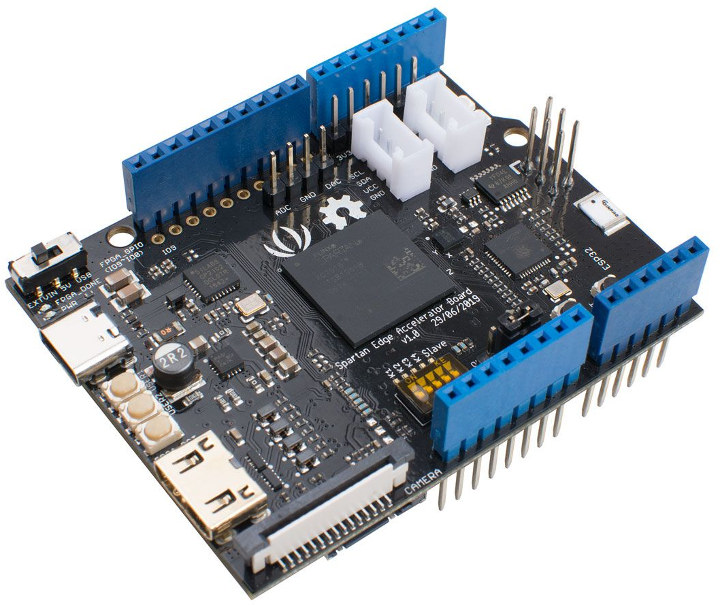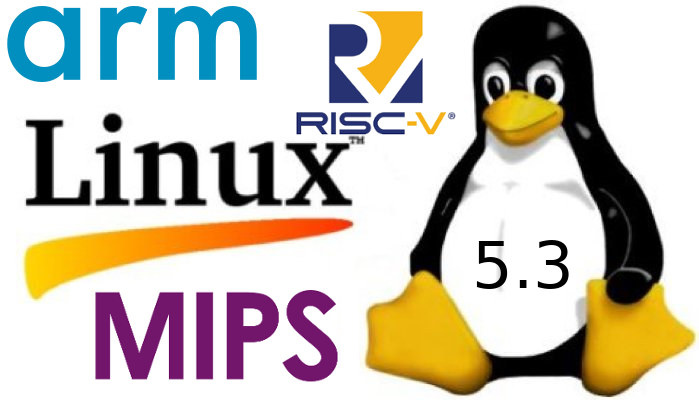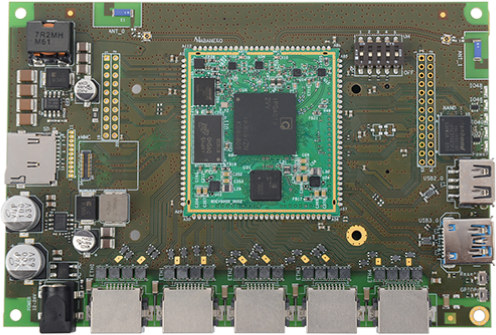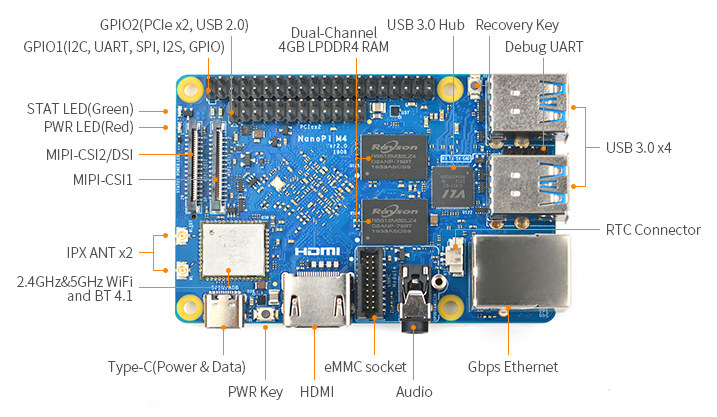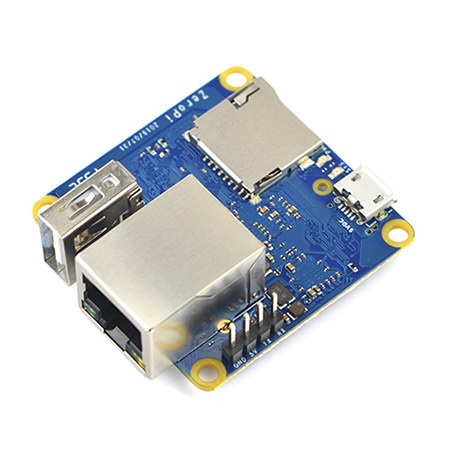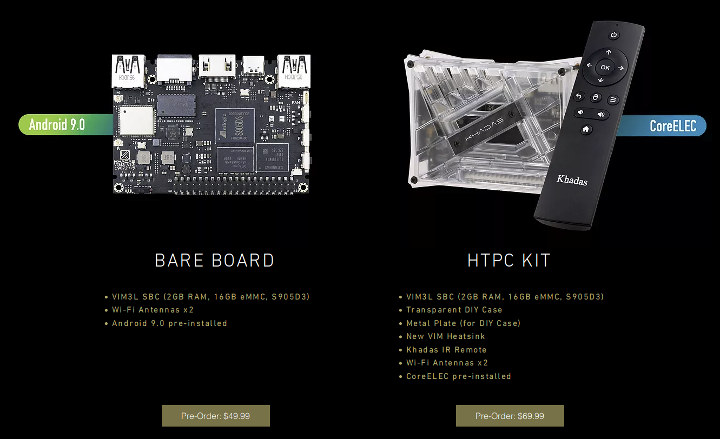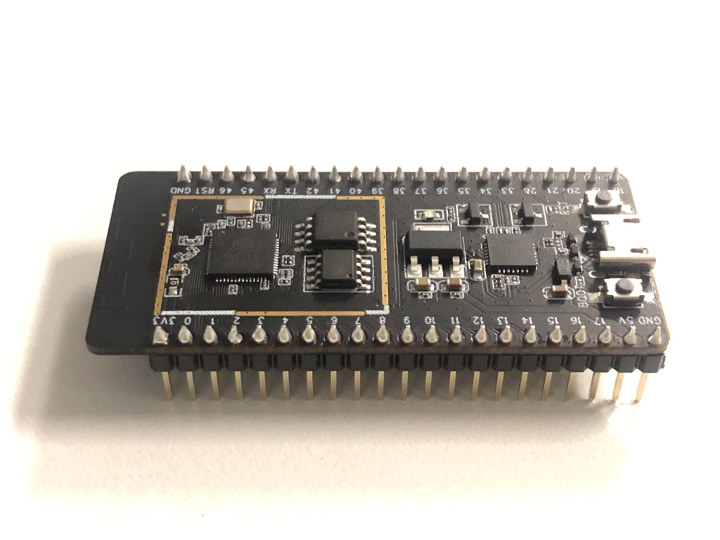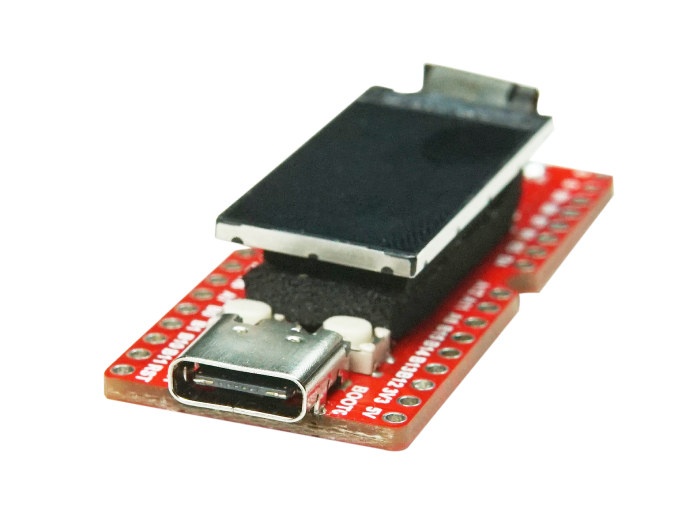Xilinx Spartan FPGAs have been around for a while, and a few years ago we covered Spartan-6 FPGA boards such as Spartixed and miniSpartan6+. Seeed Studio has now launched another Xilinx Spartan board with WiFi and Bluetooth connectivity. Spartan Edge Accelerator Board follows Arduino UNO form factor and combines a more recent Xilinx Spartan-7 FPGA with Espressif Systems ESP32 WiFi + Bluetooth chip. Spartan Edge Accelerator specifications: FPGA – Xilinx Spartan-7 XC7S15 FPGA with 12.8K Logic Cells and 360Kb block RAM WiSoC – Espressif Systems ESP32 SoC with 802.11 b/g/n 2.4GHz WiFi and Bluetooth 4.1 BLE Storage – SPI flash, MicroSD card slot Video Output – Mini HDMI Video Input – CSI Camera Interface with support for OV5640 sensor USB – USB type-C port Expansion Arduino UNO headers (5V) FPGA I/O header DAC output and ADC input header (via 8-bit ADC1173 chip) 2x Grove connectors (I2C and digital I/O) Debugging […]
Linux 5.3 Release – Main Changes, Arm, MIPS & RISC-V Architectures
Linus Torvalds has just announced the release of Linux 5.3: So we’ve had a fairly quiet last week, but I think it was good that we ended up having that extra week and the final rc8. Even if the reason for that extra week was my travel schedule rather than any pending issues, we ended up having a few good fixes come in, including some for some bad btrfs behavior. Yeah, there’s some unnecessary noise in there too (like the speling fixes), but we also had several last-minute reverts for things that caused issues. One _particularly_ last-minute revert is the top-most commit (ignoring the version change itself) done just before the release, and while it’s very annoying, it’s perhaps also instructive. What’s instructive about it is that I reverted a commit that wasn’t actually buggy. In fact, it was doing exactly what it set out to do, and did it […]
Habanero Qualcomm IPQ4019/IPQ4029 SoM Brings 802.11ac Wave2 WiFi to Linux Gateways and Routers
Last April, we first wrote about Qualcomm IPQ4019 quad-core Cortex-A7 processor with built-in 802.11ac Wave 2 WiFi, as it was found in Qualcomm Mesh Networking DevKit with support for Amazon Alexa. A few months later, we discovered router boards powered by either IPQ4019 or IPQ4029 processor such as Dakota DR40X9 or MikroTik RB450Gx4. The latter does not come with WiFi at all and instead leverages the hardware IPSec encryption built-into the processor. Habanero System-on-Module Today, we’ve come across the first IPQ4019 / IPQ4029 system-on-module we’ve countered so far, courtesy of 8devices with their Habanero and Habanero-I 802.11ac Wave 2 modules based on the respective processors. Habanero(-I) specifications: SoC – Qualcomm IPQ4019/IPQ4029 quad-core Arm Cortex-A7 processor @ 717 MHz with NEON, FPU, hardware-based NAT engine, and crypto accelerator System Memory – 512 MB DDR3L RAM Storage – 32MB NOR flash; up to 1 GB NAND flash on baseboard Connectivity QCA8075C 5-port […]
$70 NanoPi M4V2 SBC Gets 4GB LPDDR4 RAM, Power & Recovery Buttons
FriendlyELEC NanoPi M4 is a Rockchip RK3399 single board computer that follows Raspberry Pi 3 form factor, and was launched in a year ago for $65 with 2GB RAM, and $95 with 4GB RAM. Raspberry Pi 4 introduction brought some more competition, and helped the prices drop to $50 and $75 respectively. But now the company has launched a revision 2 of the board, NanoPi M4V2 that replaces LPDDR3 memory with faster LPDDR4 memory, adds power & recovery buttons, and the audio jack now also support microphone input. It’s only available with 4GB LPDDR4 memory, and the price is lower at $70. The rest of the specifications are mostly identical: SoC – Rockchip RK3399 big.LITTLE hexa-core processor with 2x Arm Cortex-A72 @ up to 2.0GHz, 4x Cortex-A53 @ up to 1.5GHz, a Mali-T864 GPU with support OpenGL ES1.1/2.0/3.0/3.1, OpenVG1.1, OpenCL, DX11, and AFBC, and a VPU with 4K VP9 and […]
FriendlyELEC ZeroPi is a Tiny Allwinner H3 SBC with Gigabit Ethernet & USB, an Optional SPI Flash
Several years ago, FriendlyELEC launched NanoPi NEO board with Allwinner H3 quad-core Cortex-A7 processor followed by NanoPi NEO2 upgrading to the Allwinner H5 64-bit Arm Cortex-A53 processor. Both boards target low-cost headless applications with I/O headers, USB and Ethernet, but while the NEO2 comes with Gigabit Ethernet, NEO SBC only features 10/100M Ethernet. The company has now been working on a new family of boards called ZeroPi that’s very similar to NanoPi NEO boards, but they do not come with any I/O headers, and the first ZeroPi board features Allwinner H3 processor, and Gigabit Ethernet. ZeroPi specifications with highlights in bold or stricken-through showing differences against NanoPi NEO: SoC – Allwinner H3 quad-core Cortex A7 @ 1.2 GHz with an Arm Mali-400MP2 GPU System Memory – 256 or 512 MB DDR3 Storage – MicroSD card slot, unmounted SPI flash Connectivity – Gigabit Ethernet via Realtek RTL8211E PHY USB – 1x […]
Khadas VIM3L SBC up for pre-order for $50 and up, VIM1 & VIM2 Price Reduced
Shenzhen Wesion recently unveiled Khadas VIM3L SBC designed for HTPC / media center use cases. The board is based on Khadas VIM3 PCB but replaces the powerful Amlogic A311D processor by Amlogic S905D3 processor that should be just as good for video playback, but enable much cheaper hardware. Khadas VIM3L Pre-orders The board is not quite available yet, but the company has started to take pre-orders for Khadas VIM3L at discounted prices either as a bare board with Android 9.0 pre-installed ($49.99), or as a CoreELEC HTPC kit with enclosure, heatsink, WiFi antennas, and IR remote control ($69.99). Both feature Amlogic S905D3 quad-core Cortex-A55 processor coupled with 2GB LPDDR4(X) RAM, 16GB eMMC flash, and support 4Kp60 video output and playback with HDR support. Prices will increase with time as follows: September 3-16 (Early Bird) – $49.99 and $69.99 for the board and HTPC kit respectively September 17 – October 7 […]
ESP32-S2 Processor Datasheet Released, Development Boards Unveiled
Last may Espressif Systems unveiled ESP32-S2 secure WiFi processor with a single Xtensa LX7 core clocked at 240 MHz, and the first ESP32 processor to come with a built-in USB (OTG) interface, as well as some new features such as WiFi Time-of-Flight (ToF), hardware security, LCD RGB & camera interfaces, and more. Note that contrary to other ESP32 processors launched so far, ESP32-S2 does not support Bluetooth. ESP32-S2 Datasheet The processor is still not available, but there has been some interesting development in recent weeks. First the datasheet (PDF) has been released, so we’ve got to check more technical details including the processor diagram below. The main specifications have not changed, so I won’t reproduce them here, and you can check out ESP32-S2 announcement for specs. ESP32-S2 Development Boards The first ESP32-S2 development boards are also available… in Espressif Systems’ offices that is, but not quite publicly. The board above […]
$5 Longan Nano GD32V RISC-V Development Board Comes with LCD Display and Enclosure
There’s been some exciting news about RISC-V microcontrollers recently with Gigadevice announcing GD32V, one of the first RISC-V general-purpose microcontrollers, which outperforms its Arm Cortex-M3 equivalent in terms of performance and power consumption. The company also announced some development boards, but they are not quite that easy to purchase being listed on Tmall website in China. The good news is that Sipeed has introduced Longan Nano development board powered by GD32VF103CBT6 microcontroller, and it’s up for sale on Seeed Studio for $4.9. Longan Nano board specifications: MCU – Gigadevice GD32VF103CBT6 32-bit RISC-V (rv32imac) microcontroller @ 108 MHz with 128KB Flash, 32KB SRAM Storage – MicroSD card slot Display – 0.96″ 160×80 IPS RGB LCD connected via SPI USB – 1x USB Type-C port for power and programming Expansion – 2x 16 through holes (2.54mm pitch) exposing 3x USART, 2x I2C, 3x SPI, 2x I2S, 2x CAN, 1x USBFS (OTG), 2x […]


